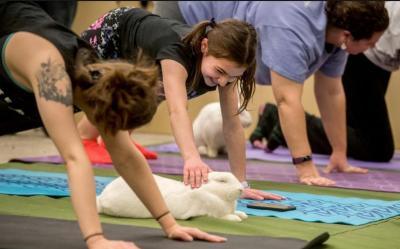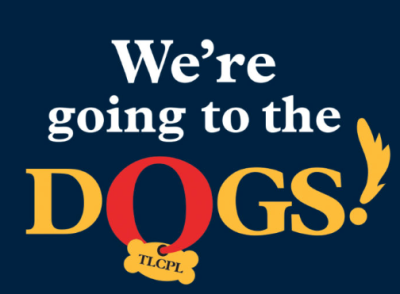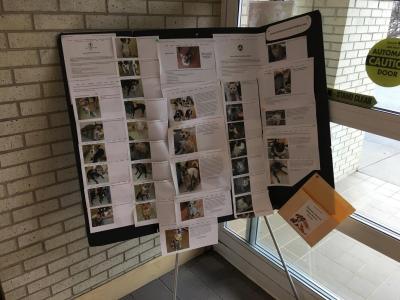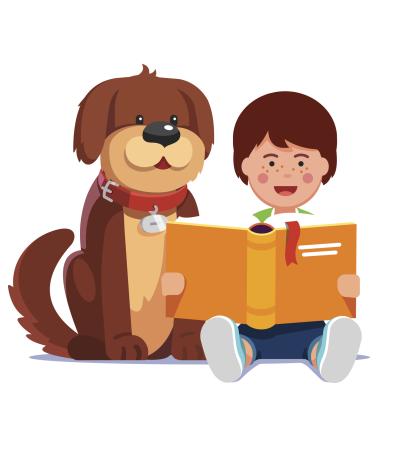When you think of health programs in public libraries, you probably think of people. But public health includes the environments in which we live, which includes the animals around us. The U.S. Centers for Disease Control and Prevention has an entire website devoted to Healthy Pets, Healthy People, and this is the topic we will explore in this month’s blog.

What kinds of programs can you do to support Healthy Pets, Healthy People in your community? As usual, the answer to this question really depends on what partnerships you’re able to form.
Wilkes, County, N.C.: Spay/Neuter Assistance
Here in North Carolina, the Wilkes County Public Library teams up with their Humane Society to offer weekly programs on Tuesday evenings in which you can sign up to participate in the Humane Society of Wilkes Spay/Neuter Assistance Program (SNAP).
“We have a strong partnership with the Humane Society because the president of our Friends group is very involved," Library Director Aimee James told me. "So they give out vouchers for people; if they meet certain income requirements, they can get a discount on spay and neuter. They're here every Tuesday evening and sometimes more often than that.”
The partnership has expanded to the point that one of the first things you see when you enter the library is a bulletin board featuring animals currently available for adoption.
Toledo, Ohio: Animal Allies
Wilkes County serves a mostly rural community in the foothills of the Appalachian Mountains. But these programs and partnerships work in urban communities as well.
In the Toledo, Ohio metro area (estimated population: 608,145), the Toledo-Lucas County Public Library recently started a new initiative called TLCPL Loves Dogs in partnership with the Lucas County Auditor and Lucas County Canine Care and Control.

In addition to offering dog licenses and license renewals at all library branches, the library offers a variety of dog programming, including the ever-popular read-to-a-therapy dog, but also things like their Animal Allies program. “This teen led club is dedicated to raising animal-welfare awareness. All teens with a passion for animals are encouraged to attend,” which meets once a month.
How can you start the partnerships that will lead to these programs? Animal shelters and humane societies are always seeking to encourage prospective pet owners to adopt rather than purchase from commercial vendors. Propose to them an event in which adoptable animals will be present. If you’re concerned about allergies, you could do it outside the library, but most shelters have some more well trained animals that would be comfortable in an indoor environment.
Nationwide: Cat Yoga
I’ve been closely monitoring these programs, and an emerging trend I’m seeing is animal yoga at the library with adoptable animals.
In northern Illinois, the DeKalb Public Library has offered a series of Cat Yoga programs in partnership with Tails Humane Society. In addition to the enjoyment of yoga with cats, there is also an educational component. Staff from the Humane Society share “information on how to bring a cat to a safe and loving home.”
This same program has been offered at the Alexander Hamilton Memorial Free Library in Waynesboro, Pa., in partnership with the Antietam Humane Society. “We bring people friendly cats to roam free during the yoga instruction,” said Kacie Morrell, the shelter's executive director. “All cats are available for adoption.” Anticipating a common concern from librarians who hear about this program, she added: “Litterboxes will also be provided."
This program has also been done at the Johnson County Public Library in Indiana. In September 2018, the library teamed up with its local Humane Society to offer Yoga with Kittens. Donations to the Humane Society were "welcomed, but not required."

Yoga with ...
Why stop with cats and dogs? Others have brought in other animals. In Pekin, Ill., part of the Peoria metro area, the library teamed up with The Charitable Bunny, a local organization that rescues and fosters abandoned pet rabbits and promotes adoption, to offer Bunny Yoga at the library in January 2020.
The bunnies were house-trained and knew what to do when nature called. “It wasn’t as bad as you would imagine," a representative from the Charitable Bunny told me. "We had litter boxes throughout and they were used.” (See more photos from the Pekin Daily Times.)
Finally, why should public libraries have all the fun? At Temple University in Philadelphia, the university library teams up with Temple's Office of Sustainability and the Philly Goat Project to offer Goat Yoga programs. Here the goal is not to get college students to adopt goats, but instead to promote the Philly Goat Project’s mission of fostering a “dynamic and exciting urban agricultural landscape, practice responsible environmentalism, and humane treatment of animals.”
Interested?
If you do embark on these type of program you will of course want to closely consult with your partner to ensure that animals brought to the library will be safe for everyone to interact with, and of course you will want participants to sign waivers (your partners most likely will already have forms they use for other adoption events). These are just some details to confirm and work out in the lead up to the event.
Use the links in this blog post to get connected to the librarians who have already successfully offered these programs (in some cases multiples times!) and think about trying something new at your library. You can play a part in promoting the CDC’s goal of Healthy Pets, Healthy People and contribute to fostering healthy communities for both humans and their four-legged friends.



